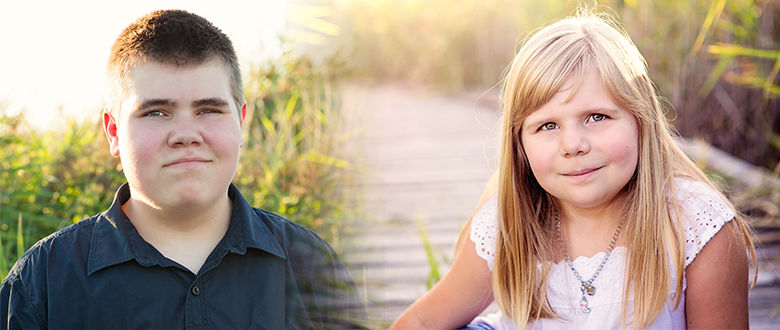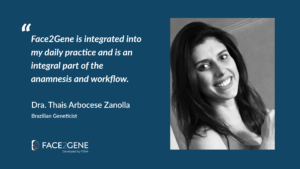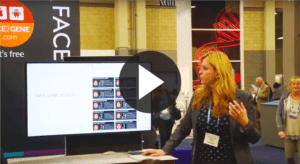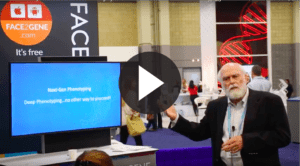FDNA highlights eye disorders in June for the Year of Discovery. We are uniting healthcare, advocacy, and technology for rare disease advancements. Every case uploaded in June will be matched with a $1 donation sponsored by Prevention Genetics, benefiting the Bardet Biedl Syndrome Foundation.* Every time a patient’s case is analyzed by Face2Gene, the de-identified information will train the system to recognize new associations between phenotypes, facial characteristics and genes. This information will improve our understanding of rare diseases and directly impact the lives of patients and families for years to come.
About Bardet Biedl Syndrome
Bardet Biedl Syndrome is a rare genetic syndrome that affects the function of cilia, which are tiny antennae-like structures on almost every cell in the body. The defect in the BBS protein causes different kinds of cells to malfunction in different ways throughout the body. BBS often causes extra fingers and toes to form when babies are developing. It usually leads to obesity and eventual vision loss. In addition, many other body systems can be affected. Some patients with BBS have kidney disease, liver disease, endocrine disorders, asthma, chronic ear infections, cognitive impairment, autism spectrum disorder, or other mental health disorders and various developmental delays.
Tyler and Lauren
Tyler is a 16-year-old young man, described by friends and family as incredibly kind and a 6’2 teddy bear. He is a rule follower and a schedule keeper. He loves reading, art classes at school, building Lego Hero Factory characters, and watching movies with friends. He takes piano lessons, is very active in his church group, is writing a book, and works a few hours a week for his Grandma.
Lauren just turned 9. She recently learned how to ride a bike. She loves playing with friends, building with Legos, watching TV shows or movies on the iPad, and helping her mom in the kitchen. Lauren also loves to sing and dance. She has played soccer for a couple of years but recently decided to stop so she can start taking dance classes.
The Beginning of Their Diagnostic Journey
This family’s journey began the day Tyler was born. He was born with extra fingers and toes and within a couple of months, they noticed that Tyler didn’t have a pectoral muscle on one side of his chest. He also had one pupil that was always smaller than the other. They were referred to the genetics department at Primary Children’s Hospital in Salt Lake City, Utah.
“We learned that the chest issue is called Poland’s Anomaly and the pupil problem is called Anisocoria but the doctors determined that the fingers, chest, and eyes were unrelated and no further testing was done,” said their mother, Amy.
Tyler underwent surgery at 4 months of age to remove his extra fingers and toes. As he grew, his parents saw that he was emotionally immature but he was overweight and his motor skills weren’t developing as quickly as other children his age. By the time Tyler turned 4 years old, his parents knew he was “different” but his doctors didn’t see any reason to be concerned. It wasn’t until he started school that they became alarmed.
“As soon as we started him in Kindergarten we knew there was something wrong. He was struggling socially and he had a very hard time following directions and doing the work at school. We could see a big difference between him and his peers,” Amy said.
They brought these concerns to Tyler’s doctors and at age 5, Tyler was diagnosed with High Functioning Autism. His parents had a diagnosis but they didn’t think it explained all of Tyler’s symptoms.
“It was a trying time as we went through all kinds of testing to determine what was going on with Tyler but it was also a relief to know that someone besides us could see that Tyler needed some extra help. Although the diagnosis [of High Functioning Autism] was helpful, we still felt like there was more going on with him,” Amy said.
The family welcomed two more children and neither of them presented with any of Tyler’s symptoms. However, when Tyler was 7 years old, his youngest sister, Lauren, was born and she also had extra fingers. The parents noticed that her temperament and development were similar to Tyler’s and they began wondering if the cause was genetic.
Could it be Bardet Biedl Syndrome?
The family continued searching for answers for Tyler and Lauren and one day, 2 years after Lauren had been born, Amy heard about another child who had been born with an extra toe. This child had Bardet Biedl Syndrome. Amy read more about BBS and realized that many of the features of BBS fit Tyler and Lauren as well.
“Because this child had been born with an extra toe I felt a connection with her story and began researching the syndrome and was completely shocked when I read through the syndrome markers and recognized so many things that matched up with Tyler and Lauren,” Amy said.
She quickly recognized that many of the features associated with BBS could also be affecting her children. This was the first time she learned that BBS causes vision loss, sometimes caused by Retinitis Pigmentosa, affecting the retina at the back of the eye. Tyler and Lauren didn’t have any vision problems at the time but she took Tyler in for an ERG vision test. The test confirmed that Tyler did have Retinitis Pigmentosa and Amy felt certain her children had BBS.
The Diagnosis
In 2011 when Tyler was 10 and Lauren was 3, they participated in a BBS study with the National Institutes of Health. Through this study, the children were clinically diagnosed with BBS and in 2014 genetic testing confirmed the diagnosis.
“Having the genetic diagnosis confirmation was a big milestone in our journey. Having that definitive answer silenced any doubt we had about whether or not the diagnosis had been correct. Because we had the correct diagnosis we could look to the future and know a little bit of what to expect,” Amy said.
After the children were diagnosed, Amy and her husband learned all they could about Bardet Biedl Syndrome and became involved with the Bardet Biedl Syndrome Family Association, run by the Bardet Biedl Syndrome Foundation. Being able to connect with other parents and patients affected by the same rare disorder provided a strong support system for the family and a way to advocate for advancements.
“The association holds a conference every other year where we hear about the latest research happening with BBS. We hear from doctors who are treating people with BBS and we also have the opportunity to connect with other people who are living with the syndrome. It’s such a special experience to share stories and experiences with others who are living with the same rare syndrome,” Amy said.
Planning for Tyler and Lauren’s Futures
Tyler and Lauren are learning to read Braille to prepare for when they will inevitably lose their vision. This kind of planning is one reason why early diagnosis is so important to families and patients with rare conditions. The family is also able to better identify which of their children’s challenges are caused by BBS so they can address them.
“The future looks good for them. We hope that they will be able to live independently and have jobs at some point. With continued weight management and diligence in their learning, they should be able to live happy fulfilling lives.”
Tyler and Lauren could later develop some of the other features and complications associated with BBS. The family feels fortunate that they are not experiencing any organ problems at the time of this writing. Right now their symptoms include polydactyly, obesity, retinal degeneration, cognitive delays, motor skill delays, and social/emotional delays.
Developing treatments and eventually curing BBS relies on continued research, advocacy, and leveraging new technologies. Early diagnosis is a critical first step in accelerating advancements for patients with these conditions. FDNA developed Face2Gene to aid in the diagnostic process and launched the Year of Discovery initiative to gather new and better information on all rare genetic syndromes, including Bardet Biedl Syndrome. Together, we can give hope to patients and families affected by rare diseases and end the diagnostic odyssey.
“My hope for the future is that no families have to wait as long as we did for a diagnosis. If more doctors knew about this rare syndrome or if genetic testing was more available it would save families years and years of searching. It would also help families get treatment at an earlier age for their children which can make a big difference in the future of that child,” Amy said.
Help Accelerate Advancements for Patients with Bardet Biedl Syndrome
Families and Patients: Ask your doctor to add your or your child’s case to Face2Gene. The personal information will only be accessible to your doctor but the de-identified data may help others who are battling a rare disease.
Healthcare Professionals: Do you have cases to upload that can help Face2Gene recognize eye disorders and accelerate advancements? Upload them through the app or at Face2Gene.com.
About the Bardet Biedl Syndrome Foundation
The Bardet Biedl Syndrome Foundation is a nonprofit association dedicated to improving the lives of individuals and families affected by BBS. The mission is to provide a support community for individuals and families; information about BBS; and promote science and research to improve the lives of individuals with BBS. They established the Bardet Biedl Syndrome Family Association and work in conjunction with the Center of Excellence for Treatment of BBS at the Marshfield Clinic and with CRIBBS, the Clinical Registry Investigating Bardet Biedl Syndrome. BBSF provides a family conference every other year to bring research information to families living with Bardet Biedl Syndrome and to provide practical advice and family connections for those raising children with BBS. Visit http://www.bardetbiedl.org/ for more information.
About PreventionGenetics
PreventionGenetics is a clinical DNA testing laboratory that provides patients with sequencing and deletion/duplication tests for nearly all clinically relevant genes, including whole exome sequencing. Prevention Genetics expands and updates its test menu, introduces new technologies, and increases efficiency to keep high-quality genetic testing attainable at a reasonable cost. Learn more at https://www.preventiongenetics.com/.
Face2Gene CLINIC is a free, HIPAA-compliant search & reference tool for healthcare professionals. Face2Gene is provided for informational purposes and not intended to replace the clinician’s judgment or experience, nor should it be used to diagnose or treat medical conditions.
*All donations are provided directly by the participating sponsor in such month and at its sole responsibility. Amounts may be capped to a maximum in each month, at the participating sponsor’s sole discretion.



